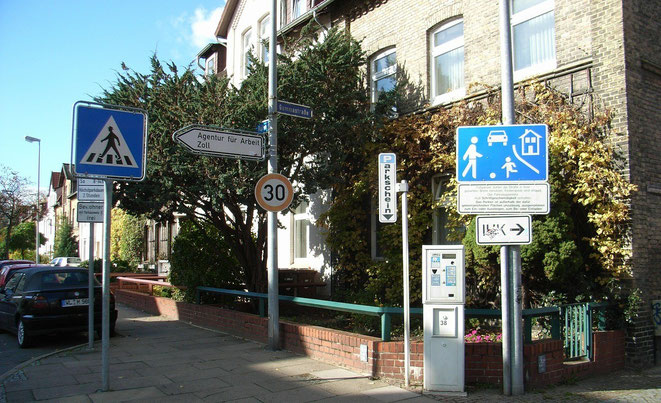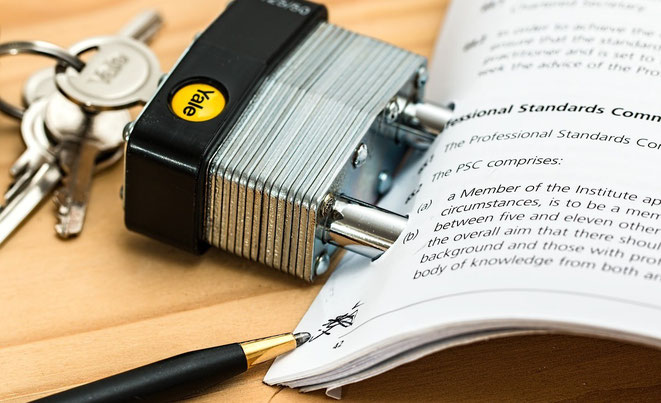by Hermann Kracke
Rules are binding...
One of these little episodes I bet you have come across before:
People in Germany use to wait at a pedestrian crossing at 2 a.m. in the morning staring at a red light albeit far and wide no kind of traffic to be seen.
Germans on the road hardly ever honk but when they do - you can be certain it is to remind another driver not to disobey a street traffic rule (and then already the faintest sign of a violation of the Road Traffic Act will suffice for a furious rebuke).
Many Germans will rather sit on their uncomfortable but rightfully allotted seat at the theater than occupy a better one that may be reserved by somebody else even if the whole place is basically empty?
There is an Ordnungsamt (Code enforcement office) dealing with minor or petty offenses, so called "Ordnungswidrigkeiten" (meaning contrary to public order) in each and every German town?

Well, True, true, true and... true:
Many Germans love regulation and structures because they help them to organize and simplify life. Equal rights (and duties - a German would add) for all also make living together fairer and more predictable.
Germans find it necessary to follow rules exactly and reliably - and be it in the deserted countryside in the middle of the night.
Straßenverkehrsordnung (StVO) is a piece of legislation making Germany one of the safer places to conduct a motor vehicle in the world but it also tells me that I’m prohibited from excessively slamming my car doors, for instance, or that cruising back and forth needlessly in municipalities is illegal.
The whole time? Trust me, they will. I’ll myself occasionally get up and take a more convenient seat but not without feeling bad about it through most of the rest of the movie.
In every town? You bet… it’s where your parking tickets come from.

Or look at it this way:
If laws were not adhered to the way they are in Germany - how could a sane person zoom down a motorway for hundreds of miles at a speed of more than 200 KM per hour in a densely populated country?
It’s nothing else but the unquestioned belief that whoever is driving in my direction ahead of me will keep the lane at any time - or in other words - herself stick to the (road traffic) rules.
…and so are promises, arrangements and agreements
Germans see acceptances in almost every context as serious obligations. Usually the moment you accept - your German partner will understand you also follow through with it and in fact, for the whole time the agreement has been made.
If you make a contract for a period of say three years but then one agreed condition occurs after 2 years and 9 months only there is still a good possibility your German partner will pull out your contract and point it out to you.
That said, in Germany every clause you find in such a document should be acceptable to you.
Your contact here will not only expect you to comply with the main terms as put down but may also hold you accountable for any ancillary agreements included. It’s safer to assume that they mean what they say from the beginning even if these do not seem real issues to you at this point.
If you sign a particular contract in Germany which is in some way not good for you at all - perhaps just to close a deal hoping that you will later be able to renegotiate the terms you actually don’t want - you do have a problem:
Not only may your partner nail you down to it but in Germany contracts are also enforceable.
Resolving a commercial dispute through the courts here may not be very fast, but faster than in many countries.
On an average it in Germany last year required 31 procedures, 394 days and a cost of 14.4% of the value of the claim - perhaps not the most efficient numbers imaginable but eventually a legitimate claim in Germany will be enforced and possibly sooner than you think.

Suggestions before you go ahead
When your German business partner needs you to sign a contract:
-
Actually read it ... and all of it - sounds obvious but everybody knows how tiring legal jargon can quickly
become.
-
If the content is not clear to you inquire about the intended stipulation. Ask your partner to help you understand what is
supposed to happen so that you can work towards a common solution.
-
If necessary take some extra time to learn what your expected role is going to be and give it some thought what a worst
case development would mean for you.
-
If a legal term is unknown to you or seems disputable get legal advice from a professional German lawyer first. Laws and
provisions (as well as taxation) are very country specific. Do not rely on a friend with some legal background to give you bulletproof advice on circumstances in
Germany.
-
Do not accept agreements just to do your German business partner a favor. If you sign an agreement - be absolutely
sure that you can and want to keep your word.
But hey
There is, or course, also one big advantage of all this German obsession with rules:
They fundamentally all work in your favor as well which can add a lot of steadiness (think cash flow) and stability to your German business in the long term.
Plus being highly enforceable you normally do not get to sign a contract at all which is not meant to be a serious arrangement.
More often than not, you in Germany know what you get and a German business owner usually honors your contract as much as she expects the same from you.



Write a comment